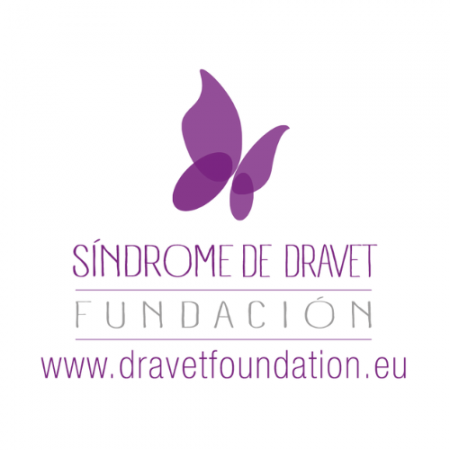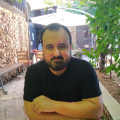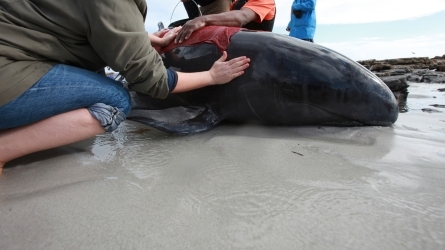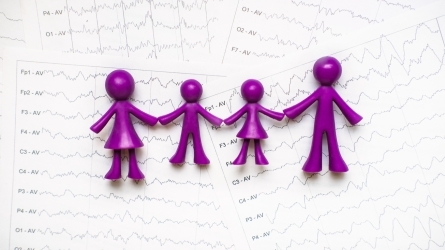
Actualización en el diagnóstico, tratamiento y manejo del síndrome de Dravet
Description
El síndrome de Dravet (SD), también conocido como Epilepsia Mioclónica Severa de la Infancia (SMEI), es una enfermedad neurológica de origen genético. Aproximadamente entre el 80% y el 90% de los pacientes afectados muestran una mutación en el gen SCN1A. Esta enfermedad es considerada rara, con una incidencia de 1 entre 16.000 nacimientos (1/2.500 para enfermedades poco comunes). Se estima que en España hay alrededor de 450-500 pacientes con un diagnóstico correcto de SD, aunque los datos de prevalencia sugieren que el número real podría superar los 1.500.
Uno de los síntomas notables del SD es la epilepsia, que suele aparecer entre los 4 y 12 meses de edad. Inicialmente, las crisis epilépticas pueden ser confundidas con crisis febriles comunes en la infancia, pero a diferencia de estas, las crisis iniciales en el SD tienden a ser prolongadas, difíciles de controlar y pueden desencadenar estados epilépticos que requieren hospitalización en unidades de cuidados intensivos. A medida que avanza la edad, es común la aparición de otros tipos de crisis, acompañados de retraso cognitivo, trastornos neurológicos y graves alteraciones de conducta.
Un porcentaje entre el 15% y el 20% de las personas con SD fallece prematuramente debido a la enfermedad. En España, existen actualmente ocho Centros, Servicios y Unidades de Referencia del Sistema Nacional de Salud en epilepsia refractaria, los cuales podrían tratar el SD. Sin embargo, dado que el SD va más allá de ser solamente una forma de epilepsia, su tratamiento necesita un enfoque multidisciplinario que involucre a profesionales de diversas áreas de la salud. Por esto, no hay un centro específico completamente capacitado para abordar la complejidad y la necesidad multidisciplinaria que conlleva el manejo y tratamiento del SD.
Este Curso de Verano aborda aspectos fundamentales para el enfoque adecuado del SD:
- Descripción de los signos y síntomas del SD y epilepsias relacionadas que pueden facilitar un diagnóstico clínico y genético.
- Discusión sobre las opciones de tratamiento emergentes para el SD en el contexto del paradigma de tratamiento actual.
- Descripción del papel del equipo multidisciplinar en el manejo de los pacientes con SD.
Objectives
Introducir al alumnado en el conocimiento de una enfermedad que, por su condición de poco frecuente, difícilmente estudiarán durante sus años de entrenamiento como futuros médicos.
Adelantarse a la educación que estos estudiantes recibirán durante futuras residencias formativas en centros y unidades docentes acreditadas para la adquisición de competencias profesionales propias de su especialidad.
Introducir o ampliar los conocimientos del alumnado profesional acerca de una enfermedad severa infradiagnosticada y no siempre bien atendida.
Generar el interés del alumnado por trabajar en un futuro con un grupo de pacientes y familias que necesita de profesionales preparados que le proporcione todos los cuidados a su alcance.
Generar a su vez el interés del alumnado por investigar en SD.
Activity directed to
- All public
- University student
- Students not from university
- Teachers
- Professionals
- Familias de pacientes con síndrome de Dravet
Program
27-06-2024
Presentation by the Director of the activity
- José Ángel Aibar --- | Fundación Síndrome de Dravet - Presidente
“Signos y síntomas del SD. Diagnóstico diferencial con respecto a otras epilepsias relacionadas“
- Antonio Gil-Nagel Rein
“Diagnóstico genético del SD y epilepsias relacionadas“
- Victoria Ros Castelló
Break
“Retos clínicos a la hora de realizar un diagnóstico“
- Ángel Aledo Serrano
Synthesis
04-07-2024
Presentation by the Director of the activity
- José Ángel Aibar --- | Fundación Síndrome de Dravet - Presidente
“Enfoques actuales en el tratamiento del SD“
- Vicente Villanueva Haba | Hospital Universitario y Politécnico La Fe - Jefe de la Unidad de Epilepsia Refractaria y del Programa de Cirugía de Epilepsia
“Datos más recientes sobre la eficacia y seguridad de nuevos fármacos. Terapias avanzadas en investigación para SD. Papel del paciente en el desarrollo de nuevos tratamientos“
- Simona Giorgi --- | Fundación Síndrome de Dravet - Directora Científica
Break
“Desafíos clínicos y tratamiento de emergencia“
- Manuel Toledo
Synthesis
11-07-2024
Presentation by the Director of the activity
- José Ángel Aibar --- | Fundación Síndrome de Dravet - Presidente
“Impacto del enfoque de equipo multidisciplinar en la calidad de vida y bienestar del paciente y su familia“
- Lucia Zumarraga Astorqui | NeuroPed - Directora
“El papel de las organizaciones de pacientes en el apoyo a las familias“
- José Ángel Aibar --- | Fundación Síndrome de Dravet - Presidente
Break
“Función de los miembros del equipo central y otros profesionales“
- Eulàlia Turón Viñas | Hospital de la Santa Creu i Sant Pau - Coordinadora Unidad de Neuropediatría
Synthesis
Closing session
- José Ángel Aibar --- | Fundación Síndrome de Dravet - Presidente
Directors
Jose Ángel Aibar has an international background in both electronics and aerospace engineering, and holds a management position in a leading technology company. One of his children has Dravet syndrome, which gave him the motivation to become involved with the Dravet Syndrome Foundation Spain, where he serves as president and chief executive officer since June 2018.
Speakers
Jose Ángel Aibar has an international background in both electronics and aerospace engineering, and holds a management position in a leading technology company. One of his children has Dravet syndrome, which gave him the motivation to become involved with the Dravet Syndrome Foundation Spain, where he serves as president and chief executive officer since June 2018.
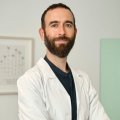
Ángel Aledo Serrano
Ángel Aledo-Serrano MD, PhD is a neurologist and epileptologist, director of the Vithas Madrid Neuroscience Institute. His main focus of clinical and research work is in the area of neurogenetics, precision medicine and developmental and epileptic encephalopathies, including Dravet syndrome and other sodium channelopathies, MOGHE, CDKL5 deficiency disorder or SYNGAP1 encephalopathy, among others. He is very active in the social and educational aspects of DEEs, with a science dissemination platform in social media (@AledoNeuro).
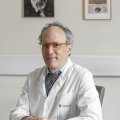
Antonio Gil-Nagel Rein
Dr. Antonio Gil-Nagel Rein graduated in Medicine and received his PhD from the Complutense University of Madrid. He specialised in Neurology at the Hospital Universitario 12 de Octubre and Fellowships at the Minnesota Comprehensive Epilepsy Centre. He practiced neurology at the University of Minnesota and Gillette Children's Hospital, Minneapolis and at Rush Medical Centre, Chicago. He is Associate Chief of Service and Director of the Epilepsy Unit of the Neurology Service of the Ruber International Hospital and President of the INCE Foundation. He is Director of the Epilepsy Programme at the Ruber Internacional Hospital in Madrid. He is Professor at IE University, Ad Honorem Professor at the Biomedical Technology Centre of the Polytechnic University of Madrid, and directs the Chair of Epilepsy at the Francisco Vitoria University in Madrid. He was one of the founding members of the European Epilepsy Research Network and the European Epilepsy Monitoring Association. In addition to being a frequent speaker at national and international meetings, he is the author of several books on epilepsy and electroencephalography, and 188 articles.

Simona Giorgi ---
Fundación Síndrome de Dravet
Simona Giorgi holds a PhD in Health Biotechnology from Miguel Hernández University and a MS in Pharmaceutical Biotechnologies from the University of Bologna. Her career is marked by active collaboration in both basic and translational research projects, with a particular focus on the study of neurons and ion channels. During her doctorate, she led projects centered on the development of a pioneering in vitro model of human sensory neurons, achieving notable advances in the compartmentalized culture of neurons. Additionally, she expanded her experience with a stay at Semmelweis University in Budapest, where she delved into the study of in vitro models of human neurons. Currently, Simona serves as the Scientific Director at the Dravet Syndrome Foundation, where she centralizes and coordinates preclinical and clinical research projects. Her work is aimed at expanding knowledge about this rare disease, with the goal of improving the quality of life for patients and their families. Moreover, Simona is dedicated to scientific dissemination, combating the stigma associated with epilepsy and disability, and providing support to families through the promotion of research.

Victoria Ros Castelló
I graduated in Medicine from the University of Barcelona. I specialised in Neurology at the Ramón y Cajal Hospital in Madrid. At the end of my residency, for my quality of care and research, I was awarded the Final Residency prize by the Teaching Commission of the Ramón y Cajal Hospital, and after completing my residency I worked as an assistant in Neurology at the Sagrat Cor University Hospital. I completed the Cleveland Clinic course (Neurophysiology, EEG and Epilepsy Course) in 2020. After obtaining a scholarship from La Caixa for post-graduate studies, I did a two-year fellowship in Epilepsy and EEG at the Montreal Neurological Hospital (McGill University, Canada). After finishing the fellowship, I took the Canadian Society of Clinical Neurophysiologists (CSCN) exam and obtained the EEG certificate. Since October 2023 I have been working at the Transversal Epilepsy Unit of the Hospital de la Santa Creu i Sant Pau and I combine my healthcare activity with research, carrying out doctoral studies at the University of Barcelona and also collaborating in several clinical trials (Marinus and Jazz Pharmaceuticals). Finally, I am part of the Telemedicine 2.0 programme of the Recover Foundation.
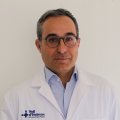
Manuel Toledo
Dr Toledo has more than 20 years of experience treating patients with epilepsy. He is a board member of the Spanish Society of Neurology and the Spanish Epilepsy Society. He is a scientific leader recognised for his contribution to epilepsy treatments.
Eulàlia Turón Viñas
EDUCATIONAL BACKGROUND Degree: Medicine and Surgery from the University of Barcelona (UB) (1996-2002). Specialist degree: Pediatrics and its specific areas. Hospital Sant Pau (2003-2007). Master in Neuropediatrics by the University of Barcelona. Sant Joan de Déu Hospital (2008-2010). Doctorate in the Pediatrics, Obstetrics and Preventive Medicine and Public Health program at the Universitat Autònoma de Barcelona (UAB) September 2020. Epilepsy Fellowship at Hospital del Mar (2020 – 2021) PROFESSIONAL EXPERIENCE Pediatrician specialized in Neuropediatrics and Pediatric Critical Care. Management of pediatric neurocritical patient. Coordinator of the Neuropediatrics Unit at Hospital Sant Pau. Coordinator of the Epilepsy Unit’s pediatrics section at Hospital del Mar – Hospital Sant Pau Associate Professor of the Degree of Medicine of the UAB, of the Master of Neuropsychology of the UAB - Hospital Sant Pau and of the Master of Pediatric Nursing of the UB - Hospital Bellvitge.
Vicente Villanueva Haba
Vicente Villanueva MD, PhD, is a neurologist in Hospital La Fe, Valencia, since 2004. Since 2005 he also works at the La Fe Multidisciplinary Epilepsy Unit, where he is Head of the Refractory Epilepsy Unit and Epilepsy Surgery Programme. He serves as a representative of the European Reference Network Epi-CARE and is a member of the ILAE Intellectual Disability Task Force. He is an Associate Professor of Neurology at the Univ. of Valencia since 2017. Dr Villanueva undertook his training at Fundación Jiménez Diaz in Madrid (ES), Epilepsy Center of Univ. of Alabama (US), Epilepsy Center of New York Univ. (US) and Hôpital Saint-Vincent de Paul in Paris (FR). His current research interests include refractory epilepsy, video-EEG monitoring, and epilepsy clinical trials and surgery. Vicente is a member of the EEG board and the Epilepsy Guidelines Board of the Spanish Neurological Society, which awarded him in 2014 with the Scientific Prize in epilepsy and author of more than 100 articles about epilepsy.
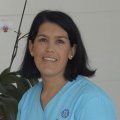
Lucia Zumarraga Astorqui
Neuropsicóloga
Fundadora y Directora de NeuroPed. Licenciada en Psicología Clínica por la Universidad Pontificia de Comillas (2002). Realizó su periodo de docencia y Diploma de Estudios Avanzados en el programa de Neurociencias en la UCM. Máster en Neurorrehabilitación por Instituto Guttman (UAB) 2007-2011 en el departamento de neuropsicología e investigación colaborando en proyectos de investigación nacional y europea en calidad de co-investigadora. Participó en el diseño y desarrollo de la plataforma de rehabilitación cognitiva NPT infantil. Gran experiencia en evaluación y tratamiento neuropsicológico de bebés, niños y adolescentes con trastornos de neurodesarrollo, daño cerebral congénito y adquirido y diversas patologías (prematuridad, enfermedades raras, discapacidad intelectual y del desarrollo). Actualmente es la Presidenta de la Asociación Madrileña de NeuroPsicología. Co-autora de la Prueba ENFEN (TEA ediciones). Participa como profesor invitado y conferenciante en jornadas, congresos y, máster y posgrados. Realizó Doctorado en Neurociencias (DEA, en la UCM). Ha desarrollado en NeuroPed una metodología única y efectiva de tratamiento consiguiendo liderar un equipo de más de 35 profesionales cuyo principal foco es el niño y su familia.
Registration fees
| Live online | Until 11-07-2024 |
|---|---|
| 10,00 EUR |
Venue
27 junio-4 julio-11 julio, Online en directo
Live online
Sustainable development goals
Agenda 2030 is the new international development agenda approved in September 2015 by the United Nations. This agenda aims to be an instrument to favour sustainable human development all over the planet, and its main pillars are the eradication of poverty, a reduction in equality and vulnerability and fostering sustainability. It is a unique opportunity to transform the world up to 2030 and guarantee human rights for all.

